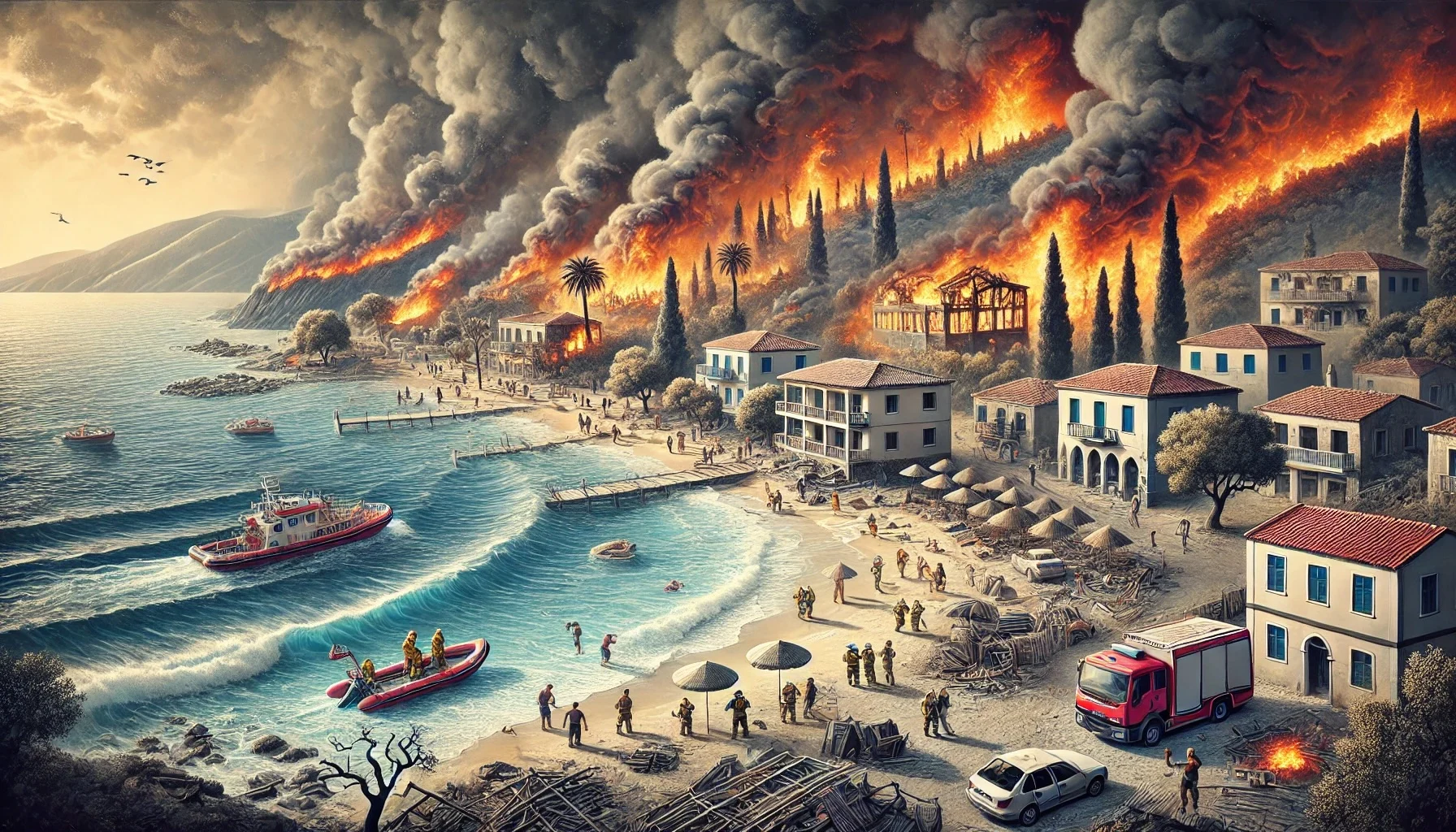
The 2018 Attica Wildfires
by: The Calamity Calendar Team
July 23, 2018
A Day of Devastation: The 2018 East Attica Wildfire
Morning: The Perfect Storm
On the morning of July 23, 2018, Greece was in the grip of a severe heatwave, with temperatures soaring above 40°C (104°F). The hot and dry conditions, coupled with gusty winds reaching up to 124 km/h (77 mph), created a tinderbox ready to ignite. The East Attica region, a picturesque area known for its coastal villages and forested landscapes, was about to face an unprecedented disaster.
Afternoon: The Fires Ignite
Shortly after noon, a small fire erupted in a forested area near Kineta, west of Athens. The exact time remains uncertain, but it is confirmed that this fire diverted critical firefighting resources. Just two hours later, another fire ignited in Daou Penteli, East Attica. Fueled by the strong winds, this second blaze spread rapidly, moving relentlessly towards the coastal village of Mati.
Evening: Trapped in Mati
Thanks for subscribing!
By 6:00 PM, the fire had reached Mati, turning the serene village into a scene of chaos and horror. Residents and tourists found themselves trapped as the flames encircled them. Desperate to escape, many fled towards the sea, hoping the water would provide refuge from the inferno. The situation was dire, with the fire spreading so swiftly that it left little time for organized evacuation.
Night: A Heroic Rescue Operation
As night fell, the flames continued their destructive march. Firefighters, volunteers, and the Greek Navy launched a massive rescue operation. Boats ferried terrified residents and tourists to safety, plucking them from the shores and waters where they had sought refuge. Despite these heroic efforts, the scale of the disaster was staggering.
The Aftermath: A Nation in Mourning
Human Toll
The wildfire claimed 102 lives, making it the deadliest in Greek history. More than 140 people were injured, and many victims were found in their homes or cars, while others perished trying to escape by sea. The loss was immeasurable, with families torn apart and communities shattered.
Property and Economic Impact
The fire left a trail of destruction, with approximately 1,500 buildings damaged or destroyed. Homes, businesses, and public infrastructure were all affected. The economic cost of the disaster was estimated at over €500 million (approximately $580 million USD), a staggering sum that underscored the scale of the devastation.
Environmental Devastation
Thousands of hectares of forest were lost to the flames, resulting in significant environmental damage. The destruction of vegetation not only affected local wildlife but also altered the ecosystem, leading to long-term ecological consequences.
Response and Recovery: Learning from Tragedy
Immediate Response
In the wake of the disaster, the Greek government declared a state of emergency. Over 600 firefighters, 300 vehicles, and several aircraft were deployed to combat the blaze. International assistance poured in, with Cyprus, Spain, Israel, and other countries offering support.
Investigation and Accountability
Initial suspicions pointed to arson, but later investigations suggested that negligence might have played a role. In 2019, legal actions were taken against several officials, including the mayor of Marathon, who were charged with negligent manslaughter and bodily harm. These charges highlighted the need for accountability and improved safety protocols.
Policy Changes and Reforms
The Mati wildfire exposed critical flaws in Greece’s emergency response system. In response, significant reforms were implemented to enhance coordination, improve early warning systems, and increase public awareness of evacuation procedures. New building regulations were introduced in high-risk areas, and forest management practices were overhauled to prevent future tragedies.
Moving Forward: A New Era of Wildfire Management
The 2018 East Attica wildfire served as a wake-up call for Greece and other Mediterranean countries facing similar risks. Since the tragedy, there have been continuous efforts to study and mitigate the effects of climate change on wildfire frequency and intensity. These studies aim to develop better strategies for wildfire prevention and response, ensuring that the lessons learned from the Mati disaster are not forgotten.
The memory of the lives lost and the devastation wrought by the fire remains a somber reminder of the power of nature and the importance of preparedness. As Greece moves forward, the resilience of its people and the improvements in wildfire management stand as a testament to the enduring spirit of recovery and hope.
Stay in the Loop!
Become a Calamity Insider and get exclusive Calamity Calendar updates delivered straight to your inbox.
Thanks! You're now subscribed.